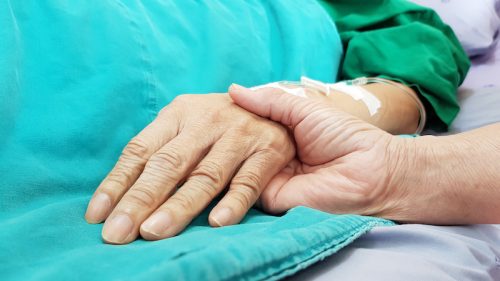By Woodeene Koenig-Bricker, Robert Fastiggi| OSV News
(OSV News) — The Catholic church teaches that all life, from conception to natural death, is sacred. However, modern medical advances have made end-of-life issues increasingly difficult to sort out. Here is an overview of important moral issues surrounding life and death.
— Why should I turn to the church when a loved one is facing an end-of-life decision?
Since such decisions are often made in times of great stress, talking to a priest can help you and your family understand church directives, assuring that your decisions are both compassionate and morally ethical. Moreover, the church offers not only the sacraments of reconciliation and the Eucharist to help those who are sick or dying, but also provides the special graces of the sacrament of the anointing of the sick.
— What does the church teach about the end of life?
First, because God is the author of all life, God forbids the intentional killing of human life, by direct or indirect means, under the Fifth Commandment. Causing a life to end, even for the best of motives, is always wrong.
Second, life in all its stages is sacred, and “Those whose lives are diminished or weakened deserve special respect” (CCC, 2276).
Third, human beings — regardless of their age, illness, social station or abilities — are never to be considered less than fully human. St. John Paul II explained: “Even our brothers and sisters who find themselves in the clinical condition of a ‘vegetative state’ retain their human dignity in all its fullness. The loving gaze of God the Father continues to fall upon them, acknowledging them as his sons and daughters, especially in need of help.”
Finally, the church does not say that life must be prolonged at all costs. Patients or their rightfully designated authorities may refuse “overzealous” treatments that are “burdensome, dangerous, extraordinary, or disproportionate to the expected outcome” (CCC, 2278). In short, only “ordinary means” of prolonging life are morally required in the case of illness and imminent death.
— What does the church mean by “ordinary means?”
“Ordinary means” refer to “the normal care due to the sick person,” including those remedies “that seem necessary or useful” (Congregation for the Doctrine of the Faith, “Declaration on Euthanasia”). The sick are to be kept clean, warm and protected from infection and pain as far as possible. They are to be given nutrition and hydration, even when these are provided by artificial means.
These “ordinary means” should be distinguished from medical treatments that are overly burdensome, risky or painful when compared to the reasonable benefit they might offer. Practically, this means that a procedure that is experimental, offers little hope of success, or is too much to bear is not obligatory. For example, a 93-year-old grandmother who is partially paralyzed by a stroke is diagnosed with breast cancer. She may decide that the risks of a mastectomy coupled with chemotherapy are more than she is willing to endure. For her, the treatment would constitute “extraordinary means.” On the other hand, for a 33-year-old mother in otherwise good health, such an operation may be merely the “ordinary” means of dealing with her cancer.
— Why shouldn’t I rely on medical professionals alone to make these decisions?
Medicine is an art as much as a science. Medical professionals can provide their best guesses as to the outcome of an illness, but ultimately God determines the span of our days. After gathering all the medical facts, it is helpful to have the advice of a priest or moral counselor to determine not only what may be considered extraordinary treatment in general, but also what may be considered extraordinary treatment in your particular case. Often, people who are gravely ill become either depressed or panicky and may struggle making rational decisions. While physicians can provide options, a priest or moral theologian can help you make the right decisions.
— Why is euthanasia wrong?
Sometimes, in a misguided attempt to alleviate suffering, people believe that euthanasia, the direct ending of life, is an act of mercy. But the church teaches that euthanasia is a “murderous act” and is always forbidden. However, a distinction must be made between euthanasia and permitting natural death. Euthanasia is “an action or an omission which of itself or by intention causes death, in order that all suffering in this way may be eliminated” (“Declaration on Euthanasia”). It is a deliberate action (for example, an overdose) or an omission (such as withholding food or water) that seeks to end a person’s life. Permitting natural death, on the other hand, means that a person’s life is allowed to take its natural course — which, for all of us, ultimately ends in death.
Special consideration must be given to painkillers that could hasten death. The church teaches that the use of painkillers “can be morally in conformity with human dignity if death is not willed as either an end or a means, but only foreseen and tolerated as inevitable. Palliative care is a special form of disinterested charity. As such it should be encouraged” (CCC, 2279). In any event, the normal care owed to a sick (even terminally ill) person must be continued. Food and fluids normally should be provided. St. John Paul II called these “a natural means of preserving life, not a medical act,” and their deliberate withdrawal constitutes murder.
— The value of suffering
Following Jesus’ example, the church has always considered care for the sick and dying an essential part of its ministry. Accepting the suffering that comes with illness, old age and the process of dying can “make a person more mature, helping him discern in his life what is not essential so that he can turn toward that which is. Very often illness provokes a search for God and a return to him. … By his passion and death on the cross Christ has given a new meaning to suffering: it can henceforth configure us to him and unite us with his redemptive Passion” (CCC, 1501, 1505).
— What should I do if I become incapacitated and dependent on others’ decisions?
According to the Patient Self-Determination Act of 1990, all hospitals and medical care facilities must provide written information about the right to accept or refuse medical treatment and the right to a “living will,” and/or how to designate “durable power of attorney.”
“Durable power of attorney” grants authority to a person you designate, who understands your moral considerations and wishes, to act as a proxy if you are unable to speak for yourself. A “living will” is a signed legal document spelling out what medical treatment and procedures you want or do not want to have done if you become incompetent.
You need to be sure before you sign a “living will” that it does not contain actions contrary to Catholic teaching, such as allowing euthanasia or physician-assisted suicide. In addition, it should state that you want a priest called to celebrate the sacrament of anointing of the sick if you are seriously ill. You should keep a copy of your “living will” in a safe place and distribute copies to your doctor and family members.
Since individual state laws vary, check with your state to see what is legal and necessary. Many dioceses have “Catholic living wills” on their websites. Without such advance directives, others may make decisions that do not correspond either to your wishes or to church teaching.






















